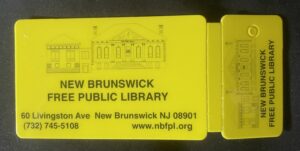Note: Originally inspired by our topics posted in October for Disability Awareness Month, there’s no better time than the stressful period during exams and right before the holidays to repurpose a post on how to relax with audiobooks. Many thanks to our colleagues in public libraries in advance who will help you get your library card if you don’t have one!
Audiobooks from the Public Library

Even if you can’t find your next book to read in the Rutgers University library catalog, public libraries in the neighborhood can help with choices to explore what to “read” next.
Did you know . . . ?
As a Rutgers University student (or faculty/staff), you are entitled to use all public library resources of your campus with a non-resident library card. For example, in New Brunswick, the New Brunswick Free Public Library (NBFPL), located on Livingston Avenue, is just a short stroll from downtown if you want to take a look at their print book collection. Don’t have time to browse print books? You can download ebooks or listen to audiobooks too. The only thing stands between you and this infinite collection is you. It’s an easy fix: you need to apply for a library card!
I tried it myself. It was amazingly simple to sign up for a membership. My card was in the mail within a few days without setting foot in the physical library in New Brunswick. But, I could start using their electronic resources immediately, once my request was approved and confirmed by a polite email from the library.
Apply for a library card!
If you kept your card current in your local library, congratulations! Did you forget to renew it? Interested in trying something new? As a Rutgers affiliate, it’s easy to apply for a card on the New Brunswick Free Public Library’s website. Of course, you will have to provide some proof, such as a photo of your Rutgers ID. After that, once you received the confirmation along with your library card number and the pin that you provided on the registration form, a whole new world will open up. Or so it did for me, a huge fan of audiobooks, who doesn’t make it to the physical library too often. Hence this post, observing Disability Awareness Month.
Trailblazers of inclusion: Audiobooks for everyone!
Audiobooks evolved tremendously fast in response to a special need, i.e., disabled World War II veterans eager to go back to school with the help of the GI Bill. Commercial applications soon followed suit. Audiobooks were the trailblazers of inclusion, going back to the American Foundation for the Blind, which first established a recording studio in 1932, almost a hundred years ago!
Of course, libraries also played a significant role: Anne T. MacDonald, assistant director of the Nurses’ Aide Corps of the American Red Cross during WWII was also a member of the Women’s Auxiliary at the New York Public Library. When she discovered a need for audiobooks for veterans with vision loss, she founded The National Committee for Recording for the Blind in New York City in 1948. More recording studios were set up in other cities, aiming to help these veterans who wished to continue their education. First, textbooks were recorded on vinyl phonograph discs. Currently called Learning Ally, the organization expanded. Now focusing on students with learning disabilities, such as dyslexia, this single group helps thousands of students every year.
Technology has come a long way. From Edison’s phonograph cylinders to vinyl records, cassette tapes, CDs and now streaming content (as highlighted in the progression of various listening devices below). Try to name as many as you can – it’s quite challenging! But, as a result, audiobooks are here to stay for everyone forever.
The many ways to enjoy audiobooks
Whether you have a disability or you simply love the versatility and convenience of audiobooks (vacuuming anyone?), the past couple of years pushed them to the forefront of library collections. You don’t have to be a multitasker or a hermit to get hooked on audiobooks once you try them.
During the pandemic, we recommended audiobooks for quarantine, including new renditions of classics for newbies, specially selected by our in-house English literature expert. As I found out, I was not the only person trying to reduce Zoom screentime and spare my eyes, so we listed a lot of options to choose from, both free and subscription-based.
Around that time, our county library system gave complimentary library cards to everyone in the county, offering content beyond our local public libraries. The temporary card provided access to more audiobooks. In addition to CloudLibrary and Hoopla from my public library, the county system also had a Libby subscription, to my immense pleasure.
Ever since I lost the opportunity to listen to books on this platform, I’ve been trying to figure out how to get access again. With my brand new library NBFPL card, now I have access to eLibrary NJ (formerly called ListenNJ, also available on OverDrive in addition to Libby) through the Libraries of Middlesex Automation Consortium (LMxAC) now called STELLA, which stands for “Sharing Technology Enhancing Local Library Access.” Signing up for one card gave me access to even more resources than I expected.
Lost in options? Ask a librarian!
Going back to Libby, after downloading it on my iPhone again, first, as I was trying to log in, I couldn’t find NBFPL in the pull-down options. A desperate but ignorant librarian, I almost contacted the library for help! Can you imagine? A librarian asking a librarian? Funny, not funny.
This is where the consortium and its name come to play (attention to details for the win, see above). STELLA is there as one of the options, duh! Picking it as my local library worked like a charm. In no time I had access to thousands of audiobooks through Libby, sometimes overlapping with the other two platforms that I use and love. From now on, I can use Libby in addition to Hoopla, which caps loans at five a month (including movies too), and CloudLibrary, which doesn’t have a monthly limit (but has my listening history of over 600 audiobooks in the past couple of years).
I must admit I am a bit skeptical about the AI-mass-produced series and these recent AI-generated narrator voices. My audiobook addiction is fueled by voices of diversity, something I am unwilling to give up. I bet, in the future, my failing eyes will also thank me and the libraries that provide online access to audiobooks!
Audiobook resources
- Cloud Library – Listen to audiobooks, browse eBooks with your library card from your public library. Currently you can check out four books at a time.
- Hoopla – Borrow audiobooks (plus movies, music, ebooks, comics, and TV shows) after registering via your public library. Number of monthly item can be restricted.
- Internet Archive – Nearly 20,000 free audiobooks from various authors to listen.
- Libby – Use Libby to borrow and read ebooks and audiobooks from your local public library for free.
- Librivox – free recordings of the many classics narrated by volunteers, often in many different versions, some of them by multiple narrators or dramatized. Also in languages other than English.
- Open Culture – Hundreds of free titles streaming, mp3, iTunes, audiobooks, and more.
Read about audiobooks
- Alison Thoet (2017, November 22). A short history of the audiobook, 20 years after the first portable digital audio device
- Grover, S., & Hannegan, L. D. (2012). Listening to learn: audiobooks supporting literacy. American Library Association.
- Heilmann, D.-M. (2019). Audiobooks for success : a comprehensive guidebook for authors, audiobook publishers, narrators, voice-over artists, and audiobook listeners. learn how to create, produce, publish, and market your audiobooks. 111 Publishing.
- Lawrence, K. (2023). Spotify’s foray into audiobooks meets resistance from Apple. SAGE Publications: SAGE Business Cases Originals.
- Rubery, M. (2011). Audiobooks, literature, and sound studies. Routledge.
